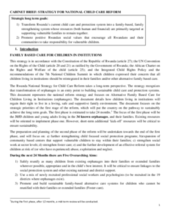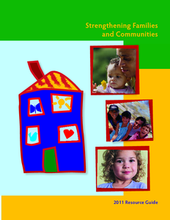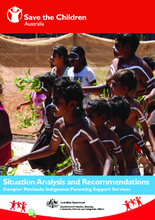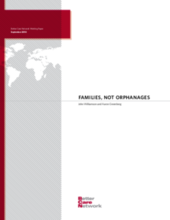Displaying 821 - 830 of 950
This is a retrospective exploratory study looking at 73 family group decision-making conferences for chidlren referred to institutional public services in Kenya.
The first ever World report on disability, produced jointly by WHO and the World Bank, suggests that more than a billion people in the world today experience disability. This report provides the best available evidence about what works to overcome barriers to health care, rehabilitation, education, employment, and support services, and to create the environments which will enable people with disabilities to flourish. The report ends with a concrete set of recommended actions for governments and their partners.
This brief was prepared by the Rwandan Ministry of Gender and Family Promotion (MIGEPROF), requesting the Cabinet to approve the proposed child care reform strategy and to support its implementation.
Resource guide developed to support service providers in their work with parents, caregivers, and children to prevent child abuse and neglect
This manual offers a training session targeted at policy makers, professionals and paraprofessionals who are already working on programs to support children without appropriate care, or who may begin work in this area. This workshop focuses on children in developing contexts, who require support within their families and those who need an alternative care placement.
This report, published by Save the Children Australia, analyzes the situation of the parenting support services for Indigenous communities in the Dampier Peninsula of Australia.
This report examines the impacts of HIV on the care choices of children, exploring how HIV affects whether or not children can remain within parental care, and on the alternative care options open to them.
Briefing note on supporting refugee families through asset-based family strengthening programs.
Call for greater political and financial commitment to help build parents’ capacity to care for their children and to tackle the poverty and social exclusion that underlie many of the problems experienced by children and their families.
With particular attention to lower income countries, this paper examines the mismatch between children’s needs and the realities and long-term effects of residential institutions. The paper examines available evidence on the typical reasons why children end up in institutions, and the consequences and costs of providing this type of care compared to other options. The paper concludes with a description of better, family-based care alternatives and recommendations for policy-makers.









